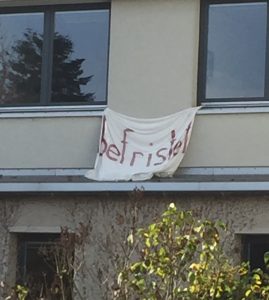
I was lucky, and honoured, in late October to visit Vechta, Lower Saxony, to give a keynote at the Gemeinsame Werte in Europa? (Common values in Europe?) conference as part of a European-wide celebration of 30 years of Erasmus funding and exchanges. Having acted as part of a European-wide panel on the future of Erasmus – especially post-Brexit – my keynote address dealt with the challenges of ‘precarity’ for many of our citizens throughout Europe and the need for radical social action to confront the increasing insecurities, uncertainties and inequities within contemporary society. It was a plea for European solidarity and action against neoliberal atomisation and its debilitating effects on the communitas, something that resonated with the European and international audience.
Last week my colleague from Universität Vechta, Magnus Frampton, continued the dialogue begun in Germany by offering an important seminar ‘What’s in a word? Bildung and pedagogy: two German understandings of education’ which explored, amongst other things, Wilhelm von Humboldt’s legacy to education. This was important in reminding us that education specifically focusing on the requirements of the economy or business is potentially damaging to the individual. It reminds us that the human and the social is central.
So, as we contribute to developing education, meaning and society, not as a linear project of the enlightenment but as a means of cultivating the self and the social and in shaping and creating anew who we are as human beings, we need to challenge and to question, to resist and make new rather than to be moulded as economic units for those with power. Long may the potential of Erasmus offer this academic freedom!
Jonathan Parker












 Beyond Academia: Exploring Career Options for Early Career Researchers – Online Workshop
Beyond Academia: Exploring Career Options for Early Career Researchers – Online Workshop UKCGE Recognised Research Supervision Programme: Deadline Approaching
UKCGE Recognised Research Supervision Programme: Deadline Approaching SPROUT: From Sustainable Research to Sustainable Research Lives
SPROUT: From Sustainable Research to Sustainable Research Lives BRIAN upgrade and new look
BRIAN upgrade and new look Seeing the fruits of your labour in Bangladesh
Seeing the fruits of your labour in Bangladesh ECR Funding Open Call: Research Culture & Community Grant – Apply now
ECR Funding Open Call: Research Culture & Community Grant – Apply now ECR Funding Open Call: Research Culture & Community Grant – Application Deadline Friday 12 December
ECR Funding Open Call: Research Culture & Community Grant – Application Deadline Friday 12 December MSCA Postdoctoral Fellowships 2025 Call
MSCA Postdoctoral Fellowships 2025 Call ERC Advanced Grant 2025 Webinar
ERC Advanced Grant 2025 Webinar Update on UKRO services
Update on UKRO services European research project exploring use of ‘virtual twins’ to better manage metabolic associated fatty liver disease
European research project exploring use of ‘virtual twins’ to better manage metabolic associated fatty liver disease